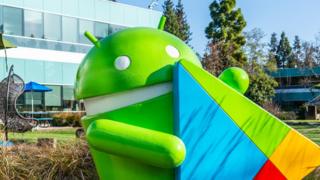Android 10 adopted faster than any other version, Google says

Image copyright
Getty Images
Google’s Android mascot, seen here at company HQ in the US
Google says Android 10 has been downloaded faster than any version in its history, hitting 100 million devices in five months.
That makes its adoption rate 28% faster than the previous version, it said.
After 300 days, 400 million users were running the latest version of the software.
However, the speed of adoption still languishes behind Apple’s iOS, which has a 92% adoption rate for its latest OS among modern iPhones.
According to ArsTechnica, Google said there were 2.5 billion active devices last year – and 400 million running the latest version is only 16% of the possible install base.
However, direct comparisons are not quite that simple. Apple makes its own phones and software updates, and releases the updates itself. Its adoption rate only counts phones released in the last four years.
Android, by contrast, is an open-source operating system used by a huge range of manufacturers which make many different devices.
Those manufacturers have traditionally had to approve major Android releases for their devices, often adding lengthy delays.
Some manufacturers have also refused to commit to updates for their phones, even when they are available.
That has frustrated some users who are waiting for new features – but some phones that have never received essential security updates could be compromised by bad actors.
- One billion Android devices at risk of hacking
- ‘How my photo ended up breaking Android phones’
Google says it has made changes to the Android update process which have allowed it to push essential updates much faster.
One example is the release of its contact-tracing backend system, used by the coronavirus tracing apps in several countries, such as Germany and Ireland.
The new system allows Google to push updates to parts of the operating system through its Google Play app store.
In a Reddit discussion, members of the Android development team wrote that the main problems with phone-makers issuing updates “are fundamentally about costs”.
They wrote that because Android is released as an open-source piece of software, it is then customised by the phone manufacturers to work with their own cameras, interface and other special considerations.
“When the next release happens, you have to take the changes you made and port them forward to (rebase onto) the new release,” they added, “This takes time and effort, and time and effort mean costs.”
The changes being made by the team are designed to allow faster updates to specific parts of the system that do not need to be approved by every individual manufacturer.
